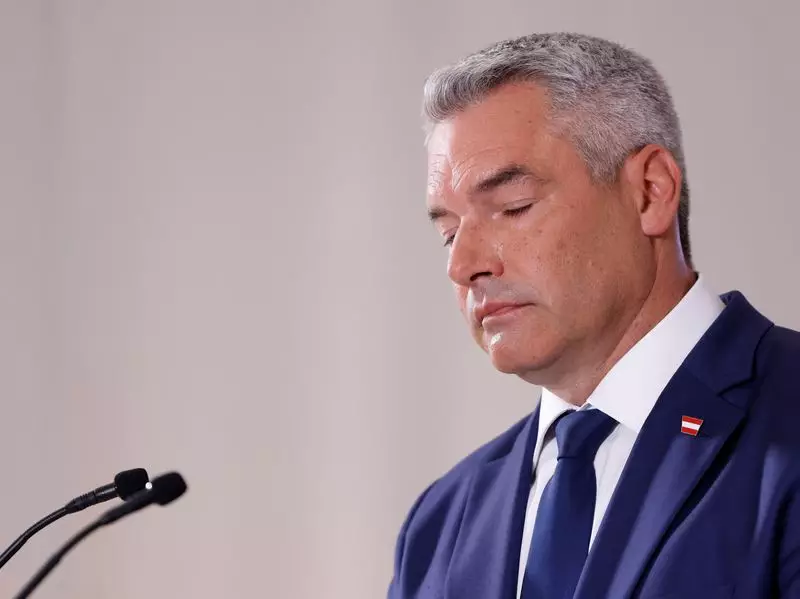The political landscape in Austria is currently characterized by turmoil and uncertainty following the resignation of Chancellor Karl Nehammer. His departure was a pivotal moment reflecting the complexities associated with forming a stable government, particularly within a political framework increasingly influenced by far-right ideologies. This article does not merely recount events but delves into the underlying implications of this leadership crisis within the context of Austria’s evolving political terrain.
Chancellor Nehammer’s resignation, announced on a tense Saturday, highlights a significant failure to forge a coalition government that excludes the far-right Freedom Party (FPO). This scenario illustrates the growing dominance of the FPO, which emerged as the leading party in the recent parliamentary elections, capturing approximately 29% of the votes. Nehammer’s leadership, marked by a commitment to centrism and distancing from the FPO, ultimately proved untenable in the face of rising populist sentiments among the electorate.
The aftermath of Nehammer’s resignation was swift, with the People’s Party (OVP) convening leadership discussions to navigate this unexpected predicament. Reports indicated that Christian Stocker would assume the role of interim party leader, though details remained vague from the party’s officials. This transitional leadership is crucial as it attempts to manage the party’s direction amidst a harsh reflection of public sentiment, which increasingly favors the FPO’s nationalist agenda.
The apparent inability to construct a viable coalition raises questions about the future of Austria’s political alliances. President Alexander Van der Bellen’s options have narrowed dramatically; he may be forced to either endorse a new coalition with the FPO or call for snap elections, the latter carrying the risk of further delaying governmental stability. Such a situation poses serious implications for Austria, as it may lead to an expedited normalization of the FPO’s far-right ideologies within mainstream politics, a worrisome prospect for many centrists and left-leaning voters.
Markus Wallner, the governor of Vorarlberg, articulated the hesitations around a snap election, emphasizing its potential to exacerbate the current crisis rather than provide a solution. Wallner’s apprehension mirrors a broader fear among moderate politicians concerned about the FPO’s growing influence and the possibility of them taking a dominant role in a future government.
The FPO’s rising popularity is undeniably tied to broader trends across Europe, wherein populist movements leverage public dissatisfaction with traditional political structures. They position themselves as the voice of the “ordinary people,” challenging the establishment and pushing themes related to identity, immigration, and economic nationalism to the forefront of political discourse. As the FPO continues to consolidate power, the parallels with other European nations experiencing similar political shifts can hardly be ignored.
Historically, the FPO has held a contentious relationship with the OVP. Despite having previously governed together, the FPO’s ascendancy poses a unique challenge for the OVP, which could find itself relegated to a junior partner role should they form a coalition. This shift would mark a significant departure from Austria’s political norms, signaling a troubling trend of traditional parties adopting more extreme positions to maintain relevance amidst an evolving electorate.
As Austria navigates this political quagmire, the implications for governance and societal cohesion are profound. The potential for a coalition with the FPO, once considered unthinkable by many within the OVP, now looms large over the political horizon. The reality that the OVP may have to compromise its values to maintain a semblance of power could lead to a fundamental shift in the identity of the party itself.
Moreover, the calls from FPO leader Herbert Kickl for immediate governance elevate the urgency of the situation, suggesting that the electorate is impatient for decisive leadership amidst uncertainty. As the political narrative continues to unfold, it will be imperative for all parties involved to carefully consider their next moves, weighing the prospects of short-term gains against the long-term implications for Austria’s democratic fabric.
The changing political dynamics in Austria present a cautionary tale about the fragility of centrist politics in an age of rising populism. The delicate balance between governance and representation is at stake, and how Austria’s leaders respond to these challenges will determine the country’s trajectory in the years to come.

